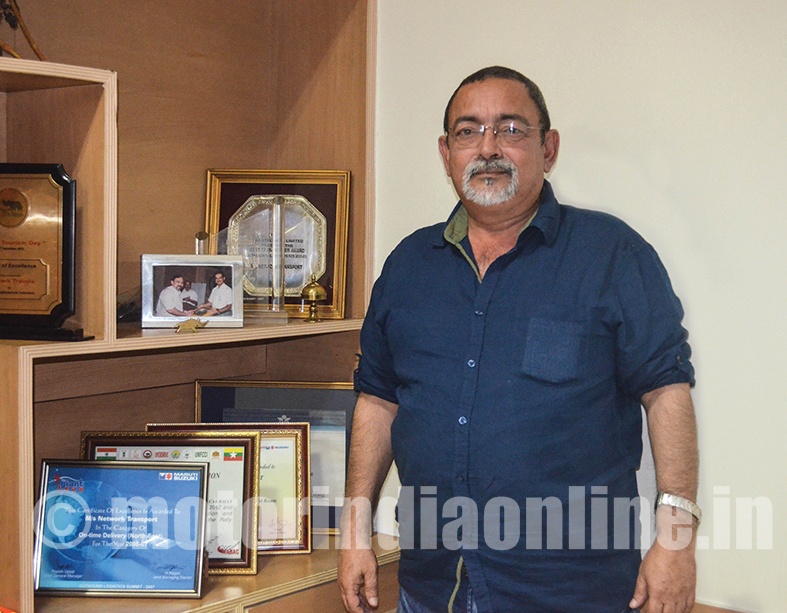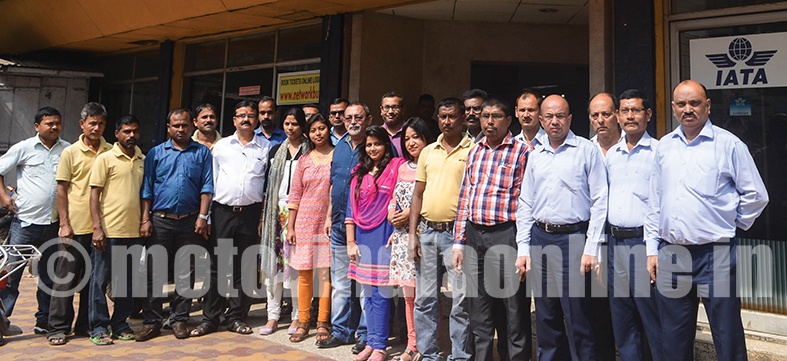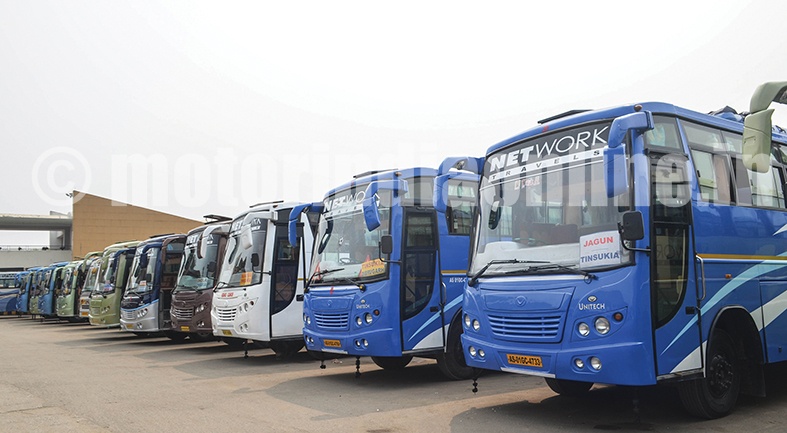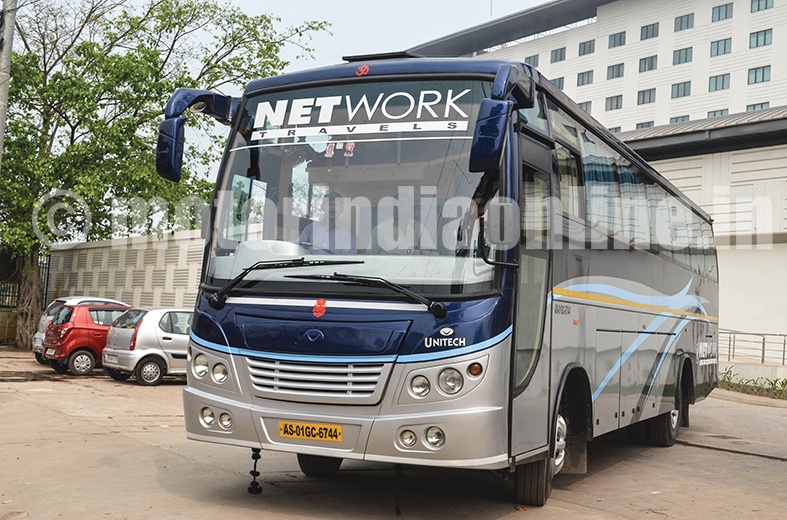Network Travels is the largest bus fleet operator in Assam and North East India. Established in 1992, Network Travels started in-bound operations in 1993 and has been successfully handling the tours and travels in North East India. The first Government-recognized tour operator in North East India, the company was incorporated to provide connectivity by road to important destinations within the region and is currently the largest operator in this segment.

Network Travels International, accredited with IATA, deals with both domestic and international air ticketing. The tourism division of the company facilitates tourists to travel to all major destinations of North East India, including Sikkim and Darjeeling. Currently headed by its founder, Mr. P. Dutta, Network Travels is surging ahead in its aim of redefining the bus transportation sector in North East India. We spoke to Mr. Dutta about his company’s vision and its role in driving the growth of bus transportation in the region.
Excerpts:
To start with, please give us a background of Network Travels. When did your journey start and how you have grown over the years?
We started our journey back in 1981 with a joint partnership introducing my first venture into travel fleet as “Trans Assam Wheels”. We introduced buses connecting inter-city route within Assam, and after 11 years of experience, in 1992 I started “Network Travels” as a proprietorship concern. With the poor state of road communication, I forecasted a huge potential to develop my business in this sector connecting most towns and cities in this region. Being driven passionately with my strategy and vision, currently we have the biggest fleet of buses in the North East in the private sector.
What is your current fleet size?
We have a current fleet of 142 buses with 81 own buses and 61 in joint operations. The fleet consists of both non-AC and AC seater coaches. We also have a fleet of around 15 Eicher mini buses which are used in transit services carrying passengers from Guwahati City to ISBT (Inter State Bus Terminus) for departure.
What are the criteria you follow when it comes to vehicle brand and product selection for your fleet?
We operate in some of the worst and extreme road conditions in India. North East India lacks road infrastructure, so we as a travel operator need to have a strategy and conditions when we select a vehicle brand for our fleet. We emphasize mostly on reliability, aftersales service, maintenance cost, availability of spareparts, passenger comfort level, etc. Operating in hilly terrains in the region with bad roads ahead, we need to take utmost care of our vehicles. We rely on vehicle brands which will sustain such extreme conditions and make us sustainable as a fleet operator.
What facilities do you have in place for fleet maintenance?
As the biggest fleet operator in the North East, our buses cover the roughest terrains and the remote corners in the region. We want to provide the best possible service to our customers, and in regard to the same we feel, fleet maintenance is very crucial in our operations. Our main workshop is at Guwahati, which has facilities like bus ramp, body repairing, bus paint shop, mechanical maintenance unit, tyre fitting unit and electrical maintenance division. With intact fleet maintenance facilities and our dedicated technicians, we maintain our buses to provide timely and better services.
How do you maintain your network of offices across Assam and North East?
Our branch offices and franchisee partners are spread across all North Eastern States and we do keep a track of the services day to day from our head office in Guwahati. Our Work officers from head office visit almost 80 per cent of the branch offices located outside Guwahati.
Do you have any new development on the operations front? Brief us on the streamlining measures you have undertaken.
As a growing operator, we stress on certain factors like punctual departure schedules, driver counselling, punctual service, proper vehicle maintenance and cleanliness. We are the first operator in North East India to introduce online ticket booking through our own website www.networkbus.in. We believe in setting benchmarks in whatever we do to improve ourselves, and I am happy that our working strategies and plans have been successful.
What are the factors you consider while planning a new route?
Before planning a new route, we consider feedback from our passengers. Secondly we consider the population of the township, its economy, road connectivity, etc. Our evaluation process also includes my personal visit along with my official team. We evaluate road conditions, possibilities of food breaks and bathroom breaks, customer suggestions and views.
We conduct trial-runs with our buses before starting a new route to ensure that both driving and road conditions are safe. We feel that it is better our drivers get accustomed to the road conditions on trial runs in the new routes before we start it officially.
How do you train your drivers to operate on new routes?
Driver selection in new routes is a vital factor for us to make our business sustainable. We let our drivers to take trial runs and evaluate the terrain on new routes. Since you know the North Eastern region has both plain and hilly terrains, the drivers are selected based on their experience in the particular terrain of the new route. Our technical survey includes fabricating a vehicle according to the terrain of the route. For example, we prefer our buses running in hilly terrains to be high in ground clearance, as we may face rocks and boulders, etc., on road due to unpredicted frequent landslides, especially in the rainy season in hilly areas. North East is also affected by seasonal floods, so while operating new routes, we do consider natural calamities too, as our buses are prone to extreme road conditions.
How do you summarize the current scenario of Omni Buses in Assam and North East in terms of service and vehicle brand selection?
First of all, I want to highlight the poor road infrastructure in Assam and North East before I come to the point. Many development projects of four laning of highways like Sri-rampur – Silchar, Guwahati – Nagaon have been undertaken, but still some projects are remaining incomplete. The single roads are also not in good shape in many places, thus making vehicle movement difficult. The major disadvantage is that the increase in vehicular traffic has led to an increase in the number of cases in accidents-prone areas. In reference to what I have said, I am very keen to introduce buses of major OEMs like Volvo, Scania and Mercedes Benz, especially multi-axles, and also let people of the region experience the comfort of such buses. But the road conditions and improper infrastructure hamper my plans and strategies. I hope for the better times to come. My main concern is that the roads should be developed and the bridges repaired. If it happens, I believe we will see luxury buses and multi-axles in most of the routes, bearing a few hilly terrain destinations. There will be a double-fold increase in seat occupancy of buses and also an increase in revenue.
Do you take passenger feedback about your services and how do you maintain your customer service network?
Yes, we do look for passenger feedback and complains and I handle them myself. The issues are taken care of, and we take immediate action on the same, as per requirement.

What edge does Network Travels have over other companies in being a successful and sustainable operator in North East India?
Our main asset and edge are the human resources and our dedicated team, which I believe is required for sustainability. Professional management is also an important factor which is very much related to our success. My future plan is based on our company policy which will make each and every staff member a stakeholder of the organisation.
It is our outlook and our vision which widens the gap between us and our nearest rivals.
Finally, what are your future plans and vision for Network Travels?
We have an app development project going on. Very soon, Network Travels will have its own mobile app on all major Mobile OS platforms. It will help commuters to book tickets easily on the go. As I have mentioned about the road infrastructure in North east; once roads are four laned in major sectors, we are planning to run multi-axle bus services on Guwahati – Jagun, Guwahati – Namsai and Guwahati – Dhola routes, which will also cover major cities in Assam like Jorhat, Dibrugarh, Tinsukia, etc. I have plans of running frequent services between Guwahati and Jorhat by multi-axles. I also prefer to run Guwahati – Itanagar on bi-axle premium luxury coaches, keeping in mind the hilly terrains in the route.
In short, we have long-term plans, which will revolutionize the way people travel on buses in North East India. We have a huge client base and it is on an incline with trust and faith in our services. The upgrade to multi-axles, I believe, will change the travelling experience of people in this region. I am optimistic about Network Travels’ rise in the coming years, and I am looking forward to exponential growth in the huge potential travel and tourism industry of North East India.
NETWORK TRAVELS STATS
* Founded in 1992
* Inbound operations started in 1993
* Longest route operated at present: Guwahati – Pasighat (621 km) and Itanagar – Joyrampur (663 km)
* Distance covered everyday: 33,000 km
* Passengers carried daily: 3,300
* Schedules per day: 132
* Workforce: 510 in total

